

Question words in German for beginners. There are a lot more ways of asking a question in German than in English! #German #Language #Grammar. Alemán: Gramática y Vocabulario Básico (A1 A2) Plantillas y Blog. Es.pinterest. Es.pinterest. Alemán, Aprender Alemán y Palabras. Es.pinterest. German Grammar: German Verbs: Strong & Irregular Verbs - Grammatik der deutschen Sprache: Liste der Starken & Unregelmäßigen Verben. 501 German Verbs, by Henry Strutz Full conjugations of multiple tenses for 501 German verbs.
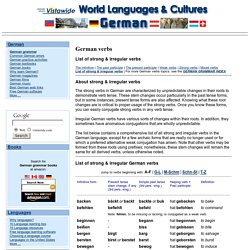
More info - Buy Historically speaking, strong verbs represent the oldest verbs in the German language. They developed already in Indo-European times (4000-1000 BC). Weak verbs are a newer invention. Rosetta Stone German Language Learning Software More info - Buy English - German Talking Dictionary / Electronic Translator Model # EGm600T Bi-directional electronic dictionary with 475,000 words.
Hammer's German Grammar and Usage, 4th ed., by Martin Durrell, List of irregular (strong) German verbs. Tip: See my list of the Most Common Mistakes in English.

It will teach you how to avoid mistakes with commas, prepositions, irregular verbs, and much more (PDF Version). There are many irregular verbs in German, and also many lists of them can be found over the Internet. This one is, however, special in many respects. It includes all the forms of irregular verbs that are necessary to derive all remaining forms and also the often overlooked subjunctive. Note: Some less common verbs were left out from the list. Subjunctive is, however, usually formed using the “würde + verb” construction, so it is not necessary to remember the simple form for all verbs (which can be found only in older literature).
The structure of the list is the following (“p.” means “person” and “s.” The rest can be derived from these forms. Ich kam, du kamst, er/sie/es kam; wir kamen, ihr kamt, sie kamen. German Grammar: German Verbs: Strong & Irregular Verbs - Grammatik der deutschen Sprache: Liste der Starken & Unregelmäßigen Verben. Irreg verbs DNutting. Learning Deutsch / German: DOWNLOADS. My deutsch resources downloads.

I officially solidly started learning deutsch early december 2011. Since then i have created several learning materials to help me better undertand the language. Just in case some of you are wondering what the terms of use are for this educational material, here they are below. These are wholely my idea and which I freely want to share. I wish to stress I do not believe i have created anything new or unique. Other than those 4 rules you're good to go! Conjugated deutsch/german verb list in infinitive form "INFINITIV" with related pronouns "PRONOMEN" the present form "PRÄSENS" the simple past form called "PRÄTERITUM" in deutsch, the perfect form called "PARTIZIP" or "PERFEKT" in deutsch the the english translation. I have also started to translate this sheets into other languages. starting with Persian. I will shortly add a link so you can download the printable PDF versions. please come back and also leave comments. below.
Zu-and-nach. Ever wanted to go to another city or to one of your friends?
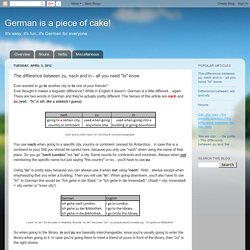
Ever thought it makes a linguistic difference? While in English it doesn't, German is a little different... again. There are two words in German and they're actually pretty different. The heroes of this article are nach and zu (well... Lesson 1: Introductions & Greetings. The very first thing you should learn in German is how to introduce yourself.
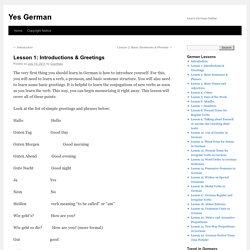
For this, you will need to learn a verb, a pronoun, and basic sentence structure. Free German lessons: Learning German online for beginners. Learn German - online, simple, independently and for free!

Handout: Negation with Nicht and Kein. Kein or Nicht? What’s the difference? « JabbaLab Language Blog. Kein and Nicht?
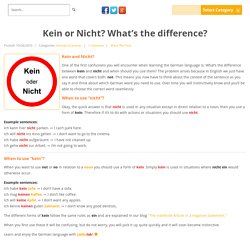
One of the first confusions you will encounter when learning the German language is: What’s the difference between kein and nicht and when should you use them? The problem arises because in English we just have one word that covers both: not. This means you now have to think about the context of the sentence as you say it and think about which German word you need to use. Over time you will instinctively know and you’ll be able to choose the correct word seamlessly. Teaching Materials.
For easier navigation and load times, I've divided these pages into eight categories.
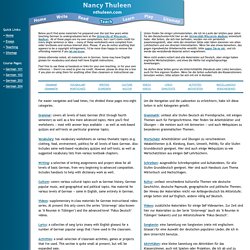
Grammar: covers all levels of basic German (first through fourth semester) as well as a few more advanced topics. Here you'll find worksheets -- most with answer keys available -- as well as web-based quizzes and self-tests on particular grammar topics. Vocabulary: has vocabulary worksheets on various thematic topics (e.g. clothing, food, environment, politics) for all levels of basic German. Also includes some web-based vocabulary quizzes and self-tests, as well as suggested vocabulary lists from various textbook chapters. Writing: a selection of writing assignments and project ideas for all levels of basic German, from very beginning to advanced composition. Teaching Materials. Possessive Pronouns. Introduction Dependent and independent possessive pronouns Dependent and independent possessive pronouns indicate possession/belonging.
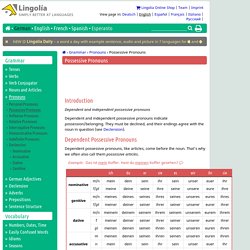
They must be declined, and their endings agree with the noun in question (see Declension). Dependent Possessive Pronouns Dependent possessive pronouns, like articles, come before the noun. Negation. Introduction We form negative sentences in German with the words nicht and kein.
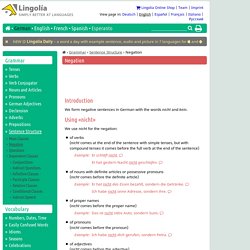
Using «nicht» We use nicht for the negation: of verbs(nicht comes at the end of the sentence with simple tenses, but with compound tenses it comes before the full verb at the end of the sentence)Example:Er schläft nicht.He’s not sleeping.Er hat gestern Nacht nicht geschlafen.He didn’t sleep last night.of nouns with definite articles or possessive pronouns(nicht comes before the definite article)Example:Er hat nicht das Essen bezahlt, sondern die Getränke.He paid for the drinks, not the food.Ich habe nicht seine Adresse, sondern ihre.I have her address, not his.of proper names(nicht comes before the proper name)Example:Das ist nicht Udos Auto, sondern Susis.This is not Udo’s car, it’s Susi’s.of pronouns(nicht comes before the pronoun)Example:Ich habe nicht dich gerufen, sondern Petra.I called Petra, not you.of adjectives(nicht comes before the adjective)Example:Das ist nicht fair!
That’s not fair! To Note. Test Your Knowledge of the German Present Tense with This Quiz. German plurals dictionary. German lessons online: German grammar for beginners - Personalpronomen. Kein or Nicht? What’s the difference? « JabbaLab Language Blog. Possessive Pronouns. Germanic languages: conjugate German verbs.